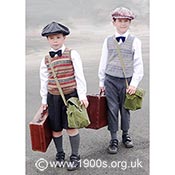How life was difficult for World War Two evacuees

Evacuees in World War Two were children sent from cities to rural areas to escape the bombing. This page describes their experiences and emotions from first hand recollections: homesickness, poor treatment, malnutrition, and censorship of letters, although it also gives examples of how life was pleasant for the fortunate few with welcoming host families.
____
By the webmaster based on firsthand recollections of former evacuees and additional research
Problems with the first phase the evacuation
With hindsight the first wave of evacuation (1st September 1939) presented a number of problems for the evacuees. Families living in the safe areas were understandably not generally happy about having someone else's child thrust on them, particularly as these first evacuees were from poor inner cities and considered rough and uncouth. In the circumstances, many of the host families treated the evacuees as nothing more than cheap labour, either for the farms or for housework. Also because the host families tried to make money from the 8 shillings paid by the government for each child's keep, many of the children were malnourished as well as being ill-treated and seriously unhappy away from home and their parents. There is a page on what it was like to host an evacuee.
Fortunately, as Hitler did not bomb Britain in the early stages of the war, often called the Phoney War (September 1939-April 1940), many of the children gradually filtered back home.
There were further waves of evacuation and re-evacuation of children to areas deemed safe. With lessons learnt, children under five were required to be accompanied by their mothers, although children over five were still evacuated alone. This was a great improvement, although life was still not comfortable for all evacuees.
What life was like for less fortunate evacuees
My dad only spoke a little of his evacuation experiences as I’m afraid they were unhappy ones. He was between schools at the time (being 11) and felt he should have been evacuated with his own age group from his new school of Tottenham Grammar. But also he spoke of being badly treated by those he was billeted with (who appeared only to want unpaid labour and treated the girls even more badly), letters home being censored. He was removed immediately when his mother came to visit and saw how unhappy he was.
contributed by Liz Manning
contributed by Anne Davey, formerly Anne Cole ((1933-2017)
I met two of the evacuee boys many years later in London and they told me how awful it had been for them. Many evacuees were exploited or neglected.
contributed by Pat Roll
I was evacuated to stay with my aunt. When I heard her talking about the bombs and deaths in London, nothing would convince me that my parents were still alive. I was in such a state that I had to be allowed back home as only seeing them would convince me that they hadn't been killed. I suspect that many other evacuee children must have suffered in the same way.
Life as an evacuee for the fortunate ones
Some evacuees of course found themselves with caring families as Albert Smith describes below.
contributed by Albert Smith, recollections
I was about five years old when I was evacuated in the first wave of the evacuations. It was without my mother to Littleborough, between Rochdale and Smallbridge in Lancashire. I can't remember leaving home or the train journey; my first recollection was being in some kind of hall which had iron beds all along each wall. Families who were to foster us evacuees were allowed to choose, and I was lucky enough to be chosen by an extremely nice couple who had a daughter of my age. So although I did feel extremely shy and out of place in my new home, I soon overcame these problems. Everyone was really nice and quite a lot of entertainment was laid on for us evacuees, usually in Rochdale Town Hall. A much enjoyed treat was being taken to a parkland swimming pool by pony and trap. On a bus trip, the driver purposely bounced us into the air by driving at speed over a humpback bridge, making everyone laugh. I do know, though, that many evacuees were not as lucky.
I attended the nearby old-fashioned school house where about 15 children of all ages were taught by one teacher and in one room. Writing was on framed slate using the slate equivalent of a pencil. A damp cloth removed anything written which was most economical.
I never saw or spoke to my mother for two to three years. However, she must have been in touch with my foster mother because items of clothing etc occasionally arrived by post, and I am sure she sent money because my first ever pair of clogs was bought for me.
I returned to London when I was about 7½. The only problem I can remember with resettling was not being able to make myself understood unless a neighbour from the north acted as my interpreter. Even she had occasional difficulty with my 'strange' language; I readopted my original accent fairly quickly though.
Sadly, I lost all contact with my northern foster parents after returning to London, except for one letter. So I've never been able to thank them properly. I have, however, built up their family tree in order to remind me of people and places to remember.
| sources | webmaster | contact |
Text and images are copyright
If you can add anything to this page or provide a photo, please contact me.



